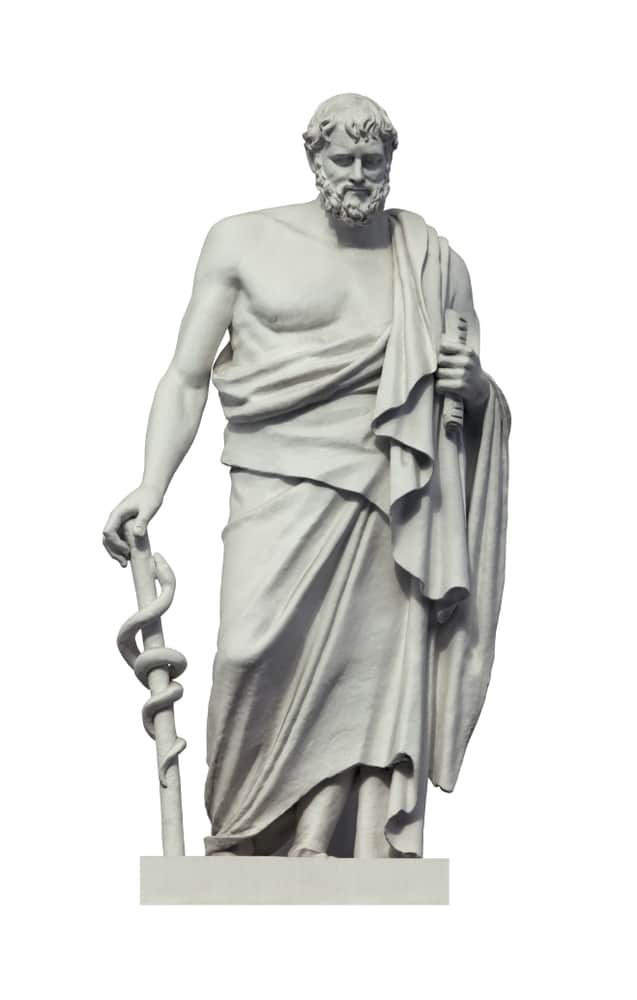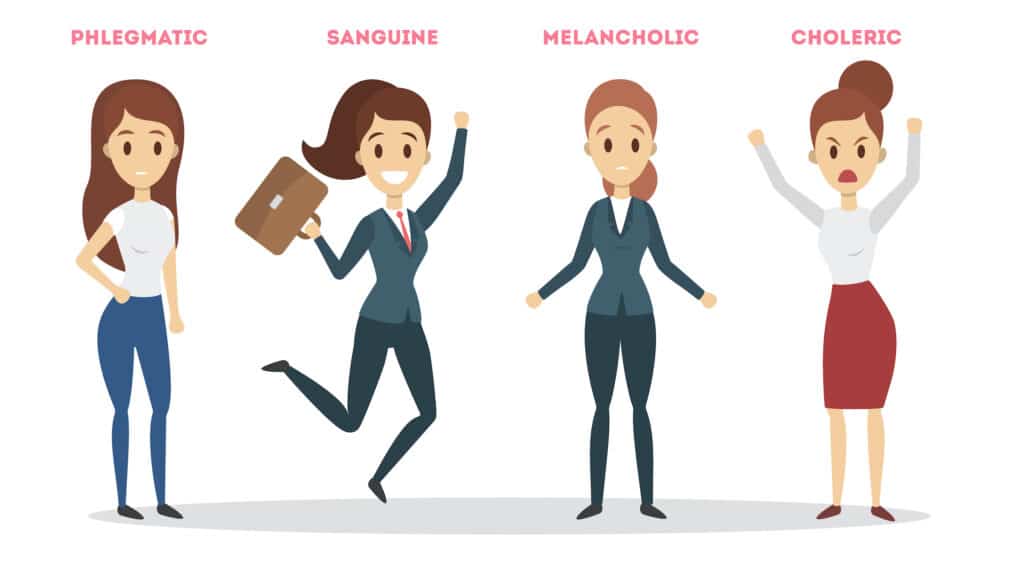
Why do some people hate to swim and others love it? Why are some people efficient and organized while others are unproductive and disorganized? Why do some people explode with anger when others would pout and withdraw? Why do some people become leaders and others are content to follow? Why does one person want an explanation for everything and another follows his gut with no questions asked? Is it luck, genetics, environment, the stars and planets, parental conditioning, or something else?
“People are different primarily because they possess different natural traits or tendencies, referred to as temperament. There are other factors that make us different including gender, when we were born and to whom, early home-life, the culture in which we were raised, education, motivation, our environment, and how we responded to these things. Nothing, however, influences daily behavior like temperament. Humanly speaking, nothing has a more profound influence on your behavior than your inherited temperament. The combination of your parents’ genes and chromosomes at conception is largely responsible for your actions, reactions, emotional responses, and to one degree or another, almost everything you do.” [1]
“…every human is born with genetically inherited ‘behavioral tendencies’ that are as much a part of their DNA as their eye color or finger-print.”
Temperament refers to a person’s natural disposition, the way in which one will consistently behave. The concept of temperament recognizes that people are born with natural ways of behaving, such as being assertive, friendly, passive, or analytical. It is a person’s temperament that makes him outgoing and extroverted or shy and introverted.
Temperament has nothing to do with a person’s character or their level of maturity. It is what a person is apart from problems. Here is my definition: “Temperament is a cluster of inborn traits that causes you, in part, to do what you do. ”
A distinction needs to be made between a “trait” and a “type.” “Types” are considered to be categories into which a person may either fit or not fit. For example, a person could be seen as either an extrovert or introvert
“The four temperaments are represented by four distinct groups of “traits” or tendencies. Each cluster of traits produces a distinct manner of behavior that is different from the other groups For example, the Choleric cluster of traits differs widely from the Sanguine cluster of traits and each will demonstrate different behavior. The Phlegmatic and Melancholy have their own unique cluster of traits that also differ widely from each other.
Each trait can be placed on a continuum from low expression to high expression. For example, one may possess the trait of being social to a high degree, moderate degree, or almost not at all.
The temperament model does not embrace the type approach to behavior. Types are restrictive and narrow in their scope and they do not leave room for different degrees of expression or development by an individual. Allport stated, “A man can be said to have a trait; but he cannot be said to have a type, rather he fits a type.”
The temperament model embraces the trait approach which allows for a particular trait to be possessed and developed to varying degrees.
Temperament, therefore, represents natural traits or tendencies with which a person is born. How well these natural traits are developed depends on the individual’s motivation. Work ethic and a person’s purpose/passion in life are also important factors in how the traits or tendencies benefit the individual.

Temperament represents the way a person relates to others and responds to events. It is what you have observed and expect someone’s behavior to be, most of the time. It is a set of in-built dispositions we are born with and is mostly unalterable. Each person comes with a factory installed wiring. How a child is wired can determine whether they will be easy or difficult to raise. When parents understand the temperament of their children they can avoid blaming themselves for issues that are normal for their child’s temperament. Some children are noisier than others. Some are more cuddly than others. Some have more regular sleep patterns than others.
Perhaps you have referred to someone as “shy” or “outgoing.” Without realizing it you were referring to certain temperament traits. These traits are what you know and expect the person to be every time you are with them. Temperament behavior is, for the most part, predictable. The exceptions being, as Dr. Geier pointed out, when one temporarily experiences strong emotions such as anger or fear, or one is trying to deceive another. Actually, acting is a form of acceptable deception. A person is knowingly acting like they are someone else. Unfortunately, some purposely act like someone they are not in order to deceive. When this occurs it is difficult to determine their temperament.
Society would not be able to exist if behavior was not basically predictable. Imagine what life would be like if everyone was different every time you met them. Imagine the chaos. Without consistency in people, without predictability, society simply would not survive.
Temperament is a force within that represents various traits or tendencies that produce an urge, drive, and appetite. Whatever temperament is, it is acting as a force that urges, even drives a person to act in a particular manner.
As an appetite or void, temperament is something that requires satisfying. This force urges, even drives a person to act in a particular manner until the temperament is satisfied. The obvious example is when you are hungry you have a need to be satisfied and to fill the void. So you eat, and when you do you are satisfied, the void is filled and you are no longer hungry. Temperament is that way. It pushes or urges you to behave according to the tendencies that represent your temperament blend.
It motivates a person to act according to their natural, innate tendencies.
For example, there are those who are natural people-people. They enjoy being with, around, or just standing by others. They like to talk, have fun and be active with others. There is a force within that person that urges them to do this. Ask one with this social bent and they will tell you, “I just want to be around people.” Conversely, there are those who are private in nature and they prefer not to be with, around or by others. There is an equal force within them that urges them to avoid contact with others. Both are normal and both have a push inside to cause them act according to their natural tendencies.
Temperament represents inherent needs. Let’s use Abraham Maslow’s definition of need. He says that a need is something that if you do not have it you get sick. Air, food, and water are physical needs without which anyone would become ill and even die. Temperament is a need without which, of course, one will not die if the needs are not met, but can indeed become emotionally and physically sick.
Temperament is a need which drives or motivates a person to act according to their natural, innate tendencies. If the needs are not met, the individual will not feel well about themselves or function efficiently.
A temperament need represents what is important and highly desirable in the core of an individual. A need is a drive that urges one to behave in such a manner until it is fulfilled. Meeting temperament needs is critical to a person’s feeling of self-worth and sense of value.
Let’s use the sociable temperament (Sanguine) as an example again. As a people-person they enjoy being with, around or standing by others. They also enjoy talking. Being with people and talking are needs. If this person is not with, standing by, or talking to people on a regular basis, they simply will not feel well about themselves and will feel “out of sorts.” They may begin to experience anxiety, confusion, frustration, or even depression. They feel themselves when they are engaged in some social activity.
This is just one of the four temperaments and the others will have specific needs as this one, but all will be different from each other. The needs represented by the four primary temperaments are natural and normal and each person is driven to have those needs met.
Everyone, therefore, should provide adequate satisfaction for their “temperament needs” in order to be at their best. For example, Cholerics need to see quick results; Sanguines need to be with people; Phlegmatics need a stable environment; Melancholies need a detailed plan.
[1] The Temperament Model of Behavior, John T. Cocoris, pg 9
[2] Personality Issues, reydonstanford.com/id20.html

HIPPOCRATES (470 -360 B.C.). Throughout history there have been many attempts to explain why people are different. One of the first systems developed was Astrology, which looked outside of man to explain the differences. There were twelve “signs” symbolized by earth, air, fire and water. Hippocrates, however, looked inside of man to explain the differences. He believed that behavior was determined by the presence of an excessive amount of one of four fluids or humors. These four humors were thought to be related to the four elements of earth, air, fire and water. Hippocrates, and other early Greeks, thought that an excess of one of the four humors produced a particular temperament and behavior.
The word “temperament” comes from the Latin word temperamentum and means right blending. The Greeks thought that a person’s “temperament” was therefore made up of a blending of these four fluids.
Hippocrates and the early Greeks were accurate in their observations of behavior but were incorrect about the origin of these tendencies. They are not created by the excess of a fluid, but we would say that they originate from some genic predisposition.
GALEN (129 – 203) was a physician, who lived 600 years after Hippocrates and was responsible for popularizing the temperaments during his time and relating them to illness. He is credited with coining the terms, Choleric, Sanguine, Phlegmatic and Melancholy.
IMMANUEL KANT (1724 – 1804) described the four temperaments in his book, Anthropology from a Pragmatic Point of View, 1798.
NICHOLAS CULPEPER (1616-1654) was the first to dispute two fundamental concepts that had existed since the time of Hippocrates. First, he rejected the idea that the four “humors” were the cause of a person’s temperament. Secondly, he was the first to say that a person is influenced by two temperaments, one primary and one secondary. Before Culpeper, it was believed that a person had only one temperament.
WILLIAM M. MARSTON (1893-1947) was the first to contribute scientific evidence that people fit into one of four categories. He published Emotions of Normal People in 1928 using the terms: Dominant, Influence, Steadiness and Compliance. Marston studied the emotions of normal people because research had centered around the emotions of abnormal people during his era. In his experiments he created a hostile environment and then observed the behavioral response of those he exposed to this environment. Repeatedly, the Cholerics would face the aggressor head on, the Sanguines would run from the danger, the Phlegmatics would freeze and do nothing. The Melancholys would also run, but they would stop, think about it and formulate a plan, and then return to face the aggressor.
OLE HALLESBY contributed penetrating insight into the behavior of the four temperaments. In his book Temperament and the Christian Faith, written in the 1930’s, he used the terms, Choleric, Sanguine, Phlegmatic and Melancholy.
JOHN G. GEIER built on the works of William M. Marston (1928), Walter Clarke (1940), and John Cleaver (1950). Clarke was responsible for developing the Activity Vector Analysis using the four dimensions of Aggressive, Sociable, Stable, and Avoidant. From this, Cleaver then created a 24-question, forced-choice instrument.
From these Geier was the first to develop (by factor analysis) an instrument that identified an individual’s behavioral style (temperament blend) and identified 15 classical patterns. These are patterns that frequently reoccurred on his instrument. Dr. Geier developed the Personal Profile System instrument in 1958 and eventually formed the company Performax to market the materials to the business community (early 1960’s). His DiSC profile enabled business companies to build a more effective team and match a person’s natural tendencies to a specific task. He used the terms: High “D” (Dominant); High “I” (Influencing); High “S” (Steadiness); and High “C” (Competent).
TIM LAHAYE was the first to popularize the concept to the Christian community. Dr. LaHaye published the first of several books in the late 1970’s using the terms, Choleric, Sanguine, Phlegmatic and Melancholy. He wrote about the dynamics of the temperament blends.
The ancient Greeks observed people and speculated on the reasons for their behavior. Their observations were supported in later centuries by a wide variety of people including medical doctors and philosophers. In the early 1900’s the scientific method was applied by Marston with the same results. The concept has been observed for centuries and verified by science that people fall into four categories, and everyone describes the four basically the same.
So it is worthy to note that this concept of temperament, that each person is born with natural tendencies which affect his or her behavior, has been steadily developing for over 2400 years. Terms have changed over the years, but the thought process remained consistent. Each successive study validated the research before it, bringing us to a point of accuracy today.

The Choleric is an extroverted, hot-tempered, quick thinking, active, practical, strong-willed and easily annoyed person. Cholerics are self-confident, self-sufficient and very independent minded. They are decisive and opinionated and find it easy to make decisions for themselves as well as others. Cholerics tend to leave little room for negotiating.
The Choleric is result-oriented. He has an active, positive movement in any antagonistic environment. He shapes his environment by overcoming opposition to get results. The choleric person is quickly and vehemently excited by any and every influence. Immediately the reaction sets in and the impression remains a long time.
“The natural virtue of the choleric is ambition; his desire to excel and succeed despises the weak, ignorant, and unskilled, and aspires to the noble and heroic.
The Choleric is a visionary and seems to never run out of ideas, plans, and goals, which are all very practical. They do not require as much sleep as the other temperaments, so their activity seems endless. Their activity almost always has a purpose because they are, by nature, goal-oriented. They can be crusaders against social injustice. They love to fight for a cause.
The Sanguine is an extroverted, fun-loving, activity-prone, impulsive, entertaining, persuasive, easily amused, and optimistic person. Sanguines are receptive and open to others and build relationships quickly. They are animated, excited, and accepting of others. They are friendly in speech and behavior and can pleasantly entertain their fellow men by their interesting narratives and witticisms. They associate easily with strangers. They will smile and talk easily and often.
“The sanguine sees everything, hears everything, talks about everything.”
He is very pleasant and willing to oblige. He is compassionate whenever a mishap befalls his neighbor and is always ready to cheer him by a friendly remark.
“A sanguine is quickly excited by an offence and may show his anger violently and at times imprudently, but as soon as he has given vent to his wrath, he is again pleasant and bears no grudge. He is pliable and docile. The virtue of obedience, which is generally considered as difficult, is easy for him. He is candid and can easily make known to a brother his difficulties, the state of his spiritual life, and even disgraceful sins. When punished he hardly ever shows resentment; he is not defiant and obstinate. Nobody is so easily seduced, but on the other hand, nobody is so easily converted as the sanguine.” [1]
The sanguine does not long over unpleasant happenings. Many things which cause others a great deal of anxiety and trouble do not affect the sanguine in the least, because he is an optimist and as such overlooks difficulties and prefers to look at affairs from the sunny side. Even if the sanguine is occasionally exasperated and sad, he soon finds his balance again. His sadness does not last long, but gives way quickly to happiness. He enjoys life. For him it is meaningful and vigorous. “For the most part, what the sanguine person experiences does not primarily lead him to think or act. He merely enjoys it. And he has unusual capacity for enjoyment since he is affected quickly and intensely by all that happens to him.” [2]
[1] greatbooksblog.wordpress.com/…/the-four–temperaments-by-rev-conrad-hock/
[2] Temperament and the Christian Faith, O.Hallesby, pg19
[3] Temperament and the Christian Faith, O.Hallesby, pg19
[4] greatbooksblog.wordpress.com/…/the-four–temperaments-by-rev-conrad-hock/
The Phlegmatic is an introverted, calm, unemotional, easygoing, never-get-upset person. He is happily reconciled to life and to his present existence, while the other types live in continual strife with their environment. The Phlegmatic is a “steady as she goes” sort of person. People with a Phlegmatic temperament slowly proceed through life expending as little energy as possible. They are the ones who will get gold watches for fifty years of faithful service doing the same job they started when they were nineteen.
The Phlegmatic has the calm, well-balanced temperament.
Phlegmatics are both slow and indirect when responding to others. They are also slow to warm-up but will be accommodating in the process. Phlegmatics are by far the easiest person with which to get along. They live a quiet, routine life, free of the normal anxieties and stresses of the other temperaments. The Phlegmatic will avoid getting too involved with people and life in general. Phlegmatics seldom exert themselves with others or push their way along in their career, they just let it happen. The Phlegmatic communicates a warm, sincere interest in others, preferring to have just a few close friends. They will be very loyal to their friends and find it difficult to break long standing relationships regardless of what the other person does. The Phlegmatic tends to resist change of any kind without reason, other than they just do not want the change to occur. Phlegmatics show little emotion and are prone to be grudge holders.
They are task oriented with a great capacity for work that requires precision and accuracy and expends a minimal amount of energy. An example of the daily routine of a Phlegmatic is to go to work, sit in a cubicle and crunch numbers all day. They will take a nap in the morning, eat lunch, have another nap, go home and go to bed after a couple of hours of TV. Since they have no temperament needs, they have no need to regenerate. So expending energy doing anything would seem like a waste.
Phlegmatic persons tend to be observers of life rather than doers. Since they take few chances and break few rules, they generally lead safe but boring lives. Many Phlegmatics have not experienced the need for God that those who operate in other temperaments are likely to experience. They take an easy going approach to life. They like to take a nap, not over-exert themselves, and rarely volunteer for anything. The Phlegmatic sits back and watches other temperaments busy doing things wrongly and looking at all the things in the world that need to be changed. Identifying the injustice is not difficult for the Phlegmatic; however, they will seldom, if ever, initiate action against injustice. They will try to inspire others to do something, but are not likely to personally get involved themselves. They work best if there is little pressure and little risk. They like to become expert at something, insuring their value in the future. They are able to perform boring or tedious work to a high standard of perfection. Think professional accountant. They neither need or desire very much social interaction, and are better off working undisturbed by others. They tend to remain calm and efficient, not easily upset.
[1] Temperament and the Christian Faith, O.Hallesby, pg75
[2] Temperament and the Christian Faith, O.Hallesby, pg76
[3] Temperament and the Christian Faith, O.Hallesby, pg78
The Melancholy is an analytical, self-sacrificing, gifted, perfectionist type with a very sensitive emotional nature. No one gets more enjoyment from the fine arts than the Melancholy. He appreciates beauty, loves art and music. Many become craftsmen of a high quality and are the most capable of perfectionism. They are very creative. Most of the world’s great composers, artists, musicians, etc. are predominantly Melancholies.
“The thinking of the melancholic easily turns into reflection and his thoughts are far reaching. He dwells with pleasure upon the past and is preoccupied with these occurrences. He is penetrating, not satisfied with the superficial. He searches for the cause and correlation of things, the principles according to which man should act. He is very analytical and carefully considers everything. This ability causes him to diagnose accurately the obstacles and dangers on any project he has a part in planning. The untrained melancholic is easily given to brooding and to day-dreaming. He is constantly thinking. At times he can be gloomy and depressed, and during these periods he becomes withdrawn and can be quite antagonistic.” [1]
“The melancholic does not feel at home among a crowd for any length of time; he loves silence and solitude. He needs his own space to work and be himself. Total privacy is very important. In company he is often distracted, because he is absorbed by his own thoughts. He always looks at life from the serious side. The melancholic is a passive temperament. He is slow, pensive, and reflective. He easily gives way to others, and does not stubbornly insist on his own opinion. On account of too many considerations and too much fear of difficulties and of the possibility that his plans or works may fail, the melancholic can hardly reach a decision. It is difficult to move him to quick action, since he has a marked inclination to passivity and inactivity. He moves forward cautiously reconsidering everything until he can form a calm and safe judgment. However, once convinced, he moves ahead with enthusiasm.” [2]
[1] greatbooksblog.wordpress.com/…/the-four–temperaments-by-rev-conrad-hock/
[2] greatbooksblog.wordpress.com/…/the-four–temperaments-by-rev-conrad-hock/
[3] greatbooksblog.wordpress.com/…/the-four–temperaments-by-rev-conrad-hock/
| Choleric (High D) Blends 1. Executive Pattern: Choleric-Sanguine (D-I) 2. Motivator Pattern: Choleric-Sanguine (D-I) 3. Director Pattern: Choleric-Phlegmatic (D-S) 4. Strategist Pattern: Choleric-Melancholy (D-C) Sanguine (High I) Blends 5. Negotiator Pattern: Sanguine-Choleric (I-D) 6. Marketer Pattern: Sanguine-Choleric (I-D) 7. Relater Pattern: Sanguine-Phlegmatic (I-S) 8. Performer Pattern: Sanguine-Melancholy (I-C) | Phlegmatic (High S) Blends 9. Inspector Pattern: Phlegmatic-Choleric (S-D) 10. Harmonizer Pattern: Phlegmatic-Sanguine (S-I) 11. Helper Pattern: Phlegmatic-Melancholy (S-C) Meloncholy (High C) Blends 12. Trainer Pattern: Melancholy-Choleric (C-D) 13. Idealist Pattern: Melancholy-Phlegmatic-Choleric (C-S-D) 14. Diplomat Pattern: Melancholy-Sanguine (C-I) 15. Analyst Pattern: Melancholy-Phlegmatic (C-S) |

It is temperament that makes some people art and music enthusiasts while others are sports or industry minded. Temperament sets broad guidelines on everyone’s behavior, patterns which will influence a person as long as he lives. Each temperament has its own unique qualities and shortcomings, strengths and challenges. What accounts for these differences?
To use the idea of temperament most effectively, it is important to understand that the four temperaments are not simply arbitrary collections of characteristics, but spring from an interaction of the two basic dimensions of human behavior: our communication and our action, our words and our deeds, or, simply, what we say and what we do.
Isn’t it interesting that some people talk about reality, while others talk about ideas. Some people do what works, while others do what’s right. The bottom line is each person has the choice to develop his natural temperament strengths and overcome his natural temperament weaknesses. To what degree this occurs depends on the individual’s motivation. It is possible to learn how to control and overcome the natural weaknesses associated with a temperament blend.
“It is of benefit furthermore to recognize one’s temperament. Only if one knows it, can he judge correctly himself, his moods, his peculiarities, his past life. If one knows one’s own temperament, he can work out his own perfection with greater assurance, because finally the whole effort toward self-perfection consists in the perfection of his strengths and in the combating of his weaknesses.
Thus the Choleric will have to conquer his obstinacy, his anger, and his pride; the Melancholic, his lack of courage and his dread of suffering; the Sanguine, his talkativeness and his inconsistency; the Phlegmatic, his laziness and his lack of energy. The person who knows himself will become more humble, realizing that many good traits which he considered to be virtues are merely good dispositions and the natural result of his temperament, rather than acquired virtues.
Consequently the Choleric will judge more humbly of his strong will, his energy, and his fearlessness; the Sanguine of his cheerfulness, of his facility to get along well with difficult persons; the Melancholic will judge more humbly about his sympathy for others, about his love for solitude; the Phlegmatic about his good nature and his repose of mind.” [1]
“Temperament is innate in each person, therefore it cannot be exchanged for another temperament. But one can and must cultivate and perfect the good elements of his temperament and combat and eradicate the undesirable ones. Every temperament is in itself good and with each one man can do good and work out his salvation. With God’s strength this is possible. “I can do everything through Christ who gives me strength” (Phil. 4:13). It is, therefore, imprudent and ungrateful to wish to have another temperament. “All the spirits shall praise the Lord” (Ps. 150: 6).” [2]
[1] ./the-four–temperaments-by-rev-conrad-hock/ pg 10
[2] ./the-four–temperaments-by-rev-conrad-hock/ pg 11